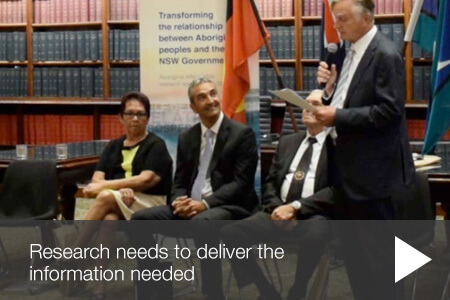Support is available for those affected by the NSW floods. Resources and information can be found at the NSW Flood Assistance and Resources page.

You are here: Home › Research and Publications › Whats Happening Now › Past Events
In this section:
Past events
Self-determination in action: Local Decision Making Accords
OCHRE: Aboriginal communities determining better outcomes
Friday, 2 December 2022
Watch the replay here.
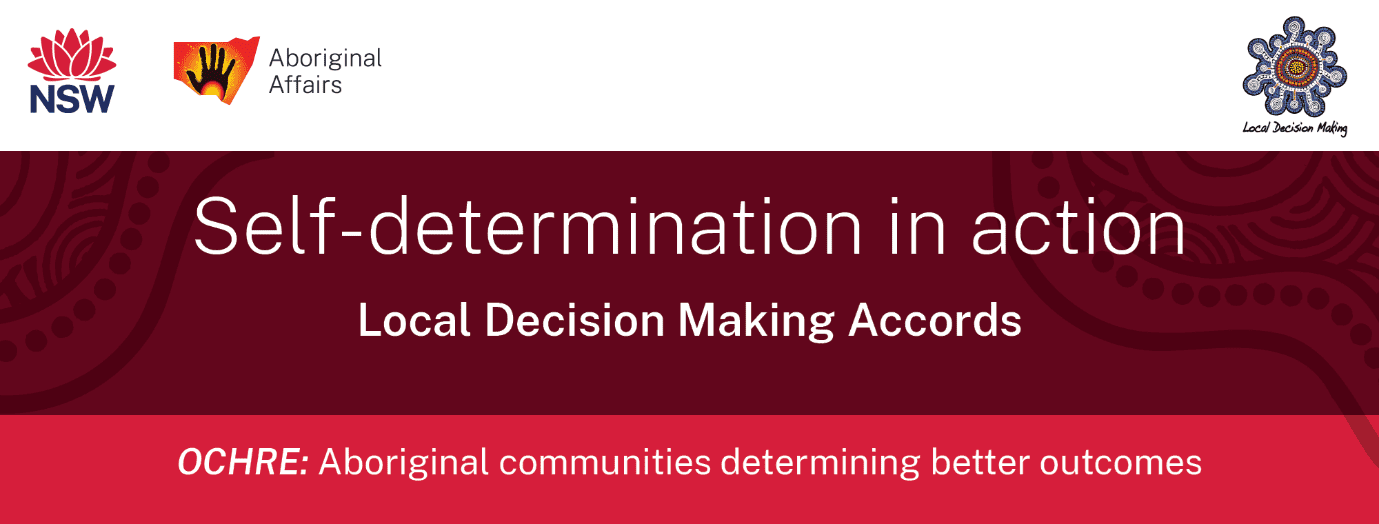
This event is the first in a series of webinars centring on the Australian National University (ANU) Centre for Aboriginal Economic Policy
(CAEPR)’s second stage evaluation of OCHRE. As part of this evaluation, CAEPR have engaged three of the participating Regional Alliances to
understand what we can learn from OCHRE’s Local Decision Making (LDM) Accord Negotiations.
Local Decision Making (LDM) is the key mechanism for agreement-making under OCHRE, where Aboriginal Regional Alliances negotiate Accords with the NSW Government to address jointly agreed service delivery priorities.
In this webinar, Deputy Secretary Aboriginal Affairs Shane Hamilton speaks with the Chairs of the participating Regional Alliances and the CAEPR researchers involved in the evaluation.
The panel speakers:
Shane Hamilton is a Wakka Wakka and Bundjalung man and the Deputy Secretary of Aboriginal Affairs NSW.
Vickie Parry is a proud Gomeroi woman and the current Executive Director of Barang Regional Alliance. Vickie is also the current Co-Chair of the New South Wales Coalition of Regional Alliances.
Des Jones is a Murrawarri man born in Brewarrina NSW, living in Wentworth. He is Chairperson of the Murdi Paaki Regional Assembly. Des is also the current Co-Chair of the New South Wales Coalition of Regional Alliances.
John Fernando is a proud Kamilaroi/Gamilaraay man from Walgett NSW. He is Chairperson of Riverina Murray Regional Alliance.
Associate Professor Deirdre Howard-Wagner and Dr Francis Markham, Centre for Aboriginal and Economic Policy Research (CAEPR), Australian National University.
Read the LDM reports here
Transforming public discourse: The media, Aboriginal aspirations and agreement-making in Australia webinar
Thursday, 5 November 2020
This was the second webinar in a series sharing the learnings and findings from our research agenda.
Agreement-making is at the heart of OCHRE — the NSW Government’s community
focused-plan for Aboriginal affairs which is committed to transforming the relationship between Aboriginal peoples and the Government.

As the fourth pillar of our democracy, media plays a central role in providing the public with information, creating public awareness and shaping public opinion. Media provide the conditions that support or hinder open, respectful and well-informed discussions about agreement-making with Aboriginal communities. The individuals and institutions that government seeks advice from including Ministers, public officials, industry bodies and researchers are not immune to the discourses.
A University of Technology Sydney study examined 45 years of news media reporting of Aboriginal efforts for self-determination, rights and
agreements. Amy Thomas, lead study author, presented this webinar alongside Rachael Hocking, a Warlpiri woman with roots in the Tanami
Desert of the Northern Territory, and NITV reporter and presenter.
About the research:
Released in early 2020, Does the media fail Aboriginal political aspirations? 45 years of news media reporting of key political moments reviews mainstream print media of 11 key moments in Aboriginal political life, finding approaches to telling stories that range from sympathetic stalling to patronising parodies.
The study was conducted by Amy Thomas, Professor Heidi Norman, and Professor Andrew Jakubowicz, with contributions from Lorena Allam, Alison Whittaker, Amy McQuire and Dr Anne Maree Payne.
It was commissioned by Aboriginal Affairs NSW as part of the OCHRE commitment, which aims to fundamentally change the relationship between government and Aboriginal communities, from unilaterialism to bi/multi-lateralism.
By understanding how the media has engaged with Aboriginal political aspirations over time, we can better understand how to shift public dialogue and achieve meaningful agreements between Aboriginal peoples and government.
Exploring Economic Prosperity for Aboriginal Peoples webinar
Thursday, 15 October 2020
This was the first in a series of free webinars to share the learnings and findings from our research agenda.
The terms economic development, wellbeing and prosperity are used in very different ways and profoundly shape the relationships between Indigenous polities, the State and diverse publics. They also influence policy frameworks and have very real impacts on First Peoples’ lives and institutions.
This webinar explored how economic development, wellbeing and prosperity are defined and operationalised in the literature and in public policy within Australia and also internationally before considering an Indigenous-informed approach to Indigenous prosperity to inform economic prosperity for Aboriginal Peoples in New South Wales in future work.
Presenters:
- Professor Tony Dreise, Director of the Centre for Aboriginal Economic Policy Research (CAEPR), Australian National University
- Dr Mandy Yap, CAEPR, Australian National University
- Dr Annick Thomassin, CAEPR, Australian National University

Charles Sturt University host the ‘Aboriginal research for our time’ seminar in Dubbo
On 23 October 2018, Charles Sturt University, Dubbo hosted the last of four research seminars planned for 2018. Over 80 students, academics, policymakers, practitioners, and community members interested in Aboriginal affairs policy reform in NSW heard about some of the areas of research that Aboriginal Affairs NSW will be exploring.
To a full house, Andrea Kelly’s keynote address highlighted the importance listening and truth telling on the road to reconciliation. Aunty Di McNaboe, Connie Ah See, Julie Blackhall, Sam Jeffries and Des Jones added local knowledge and wisdom to the presentations and subsequent deliberations.
Southern Cross University host the ‘Aboriginal research for our time’ seminar in Lismore
On 26 July 2018, Southern Cross University, Lismore hosted the third of four seminars planned for 2018. Over 130 students, academics, policymakers, practitioners, and community members interested in Aboriginal affairs policy reform in NSW heard about some of the areas of research that Aboriginal Affairs NSW will be exploring.
To a full house, Dr Chris Sarra’s keynote address highlighted the importance of acknowledging and embracing Indigenous leadership in communities. Other highlights included the discussion between Dr Gabrielle Russell-Mundine and Wahlabul and Bundjalung community members of what it means to be a culturally capable public servant, the conversation between Jason Ardler and Jeff McMullen about the impact of then negative public discourse about Aboriginal peoples and the impact of Aboriginal perspectives on policy development, Professor Heidi Norman’s presentation on the return of public lands to Aboriginal control/ownership, and the discussion between Anthony Seiver and Callum Clayton-Dixon about the revival of Aboriginal languages.
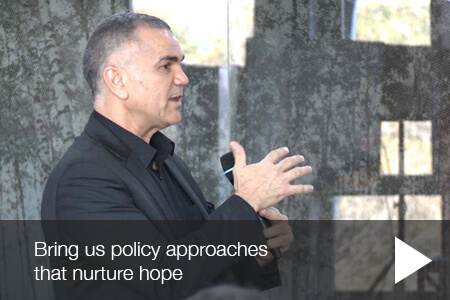
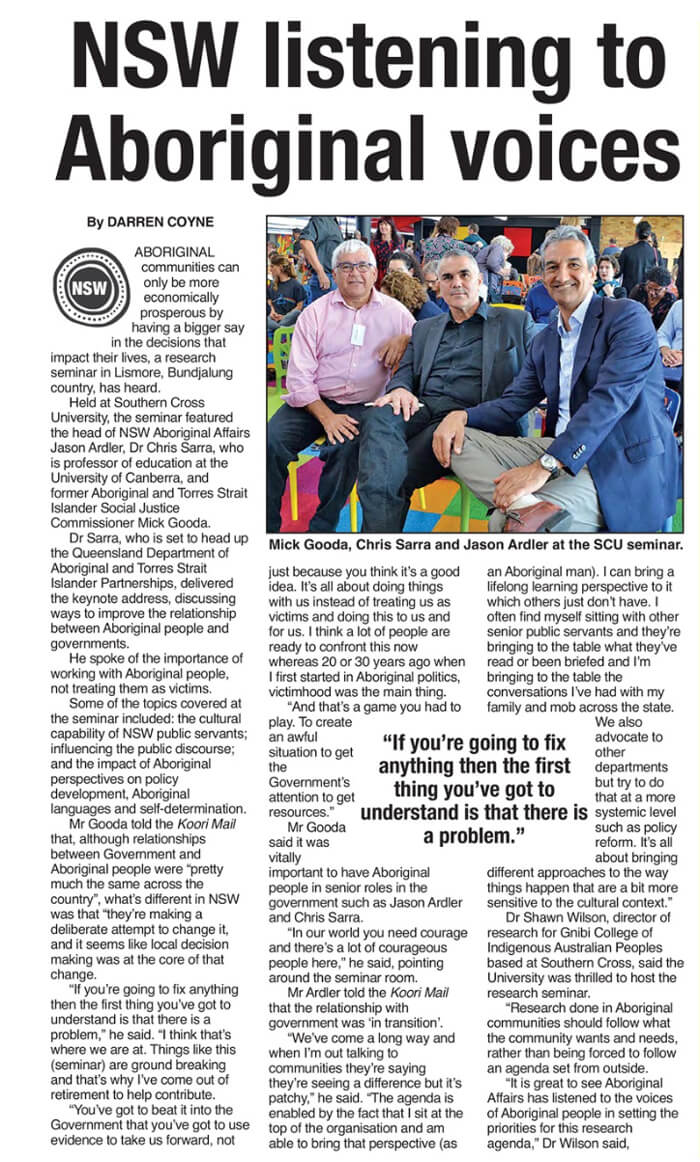
The Australian National host the ‘Aboriginal research for our time’ seminar in Canberra
On 11 April 2018, the Australian National University, Canberra hosted the second of four seminars planned for 2018. Bringing together the key contributors to the Aboriginal Affairs NSW research agenda, the seminar provided an opportunity for students, academics, policymakers, practitioners, and community members interested in Aboriginal affairs policy reform in NSW to hear about the policy and research findings of their work and to discuss research implications. To a full house the CEO of the Australian institute of Aboriginal and Torres strait Islander Studies Craig Richie’s keynote address made the case of research informed policy.
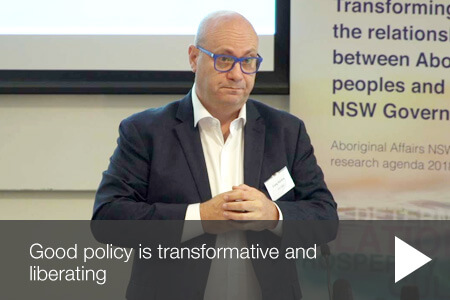
The University of Technology host the ‘Aboriginal research for our time’ seminar in Sydney
On 1 March 2018, the University of Technology, Sydney hosted the first of four seminars planned for 2018. Bringing together the key
contributors to the Aboriginal Affairs NSW research agenda, the seminar provided an opportunity for students, academics, policymakers,
practitioners, and community members interested in Aboriginal affairs policy reform in NSW to hear about the policy and research findings of
their work and to discuss research implications. To a full house Mick Gooda’s keynote address reminded us that research is our friend.
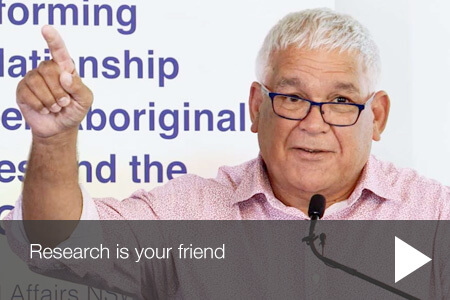
The Hon. Sarah Mitchell MLC launches research agenda
On 28 February 2018 the Honourable Sarah Mitchell MLC, Minister for Aboriginal affairs launched the Aboriginal Affairs NSW research agenda at Parliament House. In conversation with Jeff McMullen AM, Jason Ardler the Head of Aboriginal Affairs, and Aunty Jean Hands the Chair of the Northern Rivers Regional Alliance and the NSW Chairs of Aboriginal Regional Alliances spoke about the their desire for a new narrative in Aboriginal affairs. Particular attention was given to the critical role of the extended research community in delivering the evidence that supports Aboriginal communities and the NSW Government to work together to determine what works, what’s worth trying and what success looks like.
Go Back
